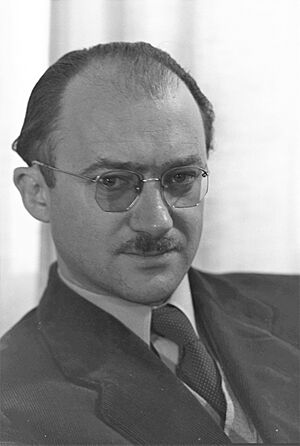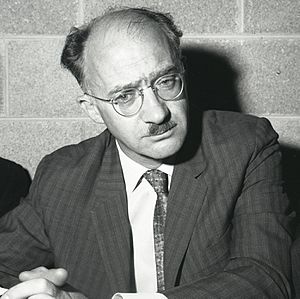Abraham Sutzkever facts for kids
Abraham Sutzkever was a very famous Yiddish poet. Many people, including The New York Times, called him "the greatest poet of the Holocaust." He wrote powerful poems about his experiences during a very difficult time in history.
Contents
Abraham Sutzkever's Life Story
Abraham Sutzkever was born on July 15, 1913, in a place called Smorgon. This area was part of the Russian Empire back then. Today, it is in Belarus. During World War I, his family moved to Siberia. Sadly, his father died there.
In 1921, Abraham and his mother moved to Vilnius. This city is now the capital of Lithuania. He went to school there and also studied Polish and Russian poetry. He even wrote his first poems in Hebrew.
Joining the Yung-Vilne Group
In 1930, Abraham joined a Jewish scouting group called Bin (which means "Bee"). He published his first writing in their magazine. This is also where he met his future wife, Freydke.
By 1933, he became part of a special group of writers and artists. They were called Yung-Vilne, meaning "Young Vilna." Other talented poets like Chaim Grade were also in this group.
He married Freydke in 1939. This was just one day before World War II began.
Life During World War II
In 1941, the Nazis took over Vilnius. Abraham and Freydke were forced to live in the Vilna Ghetto. This was a small, crowded area where Jewish people were made to live.
Abraham and his friends bravely hid important items. They hid a diary, drawings by famous artists, and other valuable works. They hid them behind walls in the ghetto to keep them safe.
During this terrible time, Abraham's mother and his newborn son were murdered by the Nazis. On September 12, 1943, he and Freydke managed to escape the ghetto. They went into the forests and joined a group of fighters called partisans. They fought against the Nazi forces.
Rescue and New Beginnings
Abraham joined a Jewish fighting unit. He was secretly taken into the Soviet Union. In 1943, he wrote a long poem called Kol Nidre. This poem reached important people in Moscow. They asked the government to help rescue him.
So, in March 1944, an airplane found Abraham and Freydke. They were flown to Moscow, where their daughter, Rina, was born.
In February 1946, Abraham was asked to be a witness at the Nuremberg trials. These were trials where Nazi war criminals were judged. He spoke about Franz Murer, who was responsible for the murder of his mother and son.
After a short time in Poland and Paris, he moved to Mandatory Palestine (which is now Israel). He arrived in Tel Aviv in 1947.
Life in Israel and Later Years
In Tel Aviv, Abraham started a very important Yiddish literary magazine. It was called Di goldene keyt (The Golden Chain). This magazine helped many Yiddish writers from all over the world.
Abraham loved to travel. He visited jungles in South America and African plains. Seeing elephants and hearing songs from a Basotho chief inspired him to write even more Yiddish poems.
In 1985, Abraham Sutzkever received the famous Israel Prize for his writing. He was the first Yiddish writer to win this award.
His wife, Freydke, passed away in 2003. Abraham Sutzkever died on January 20, 2010, in Tel Aviv. He was 96 years old. He is remembered through his two daughters, Rina and Mira, and his grandchildren.
Abraham Sutzkever's Writing Journey
Abraham Sutzkever started writing poetry when he was young. His first poems were in Hebrew. He published his very first poem in the Jewish scouts magazine, Bin.
In the early 1930s, he was part of the Yung Vilne group. These were modern writers and artists. In 1937, his first book of Yiddish poems, Lider (Songs), was published. A second book, Valdiks (Of the Forest), came out in 1940.
Poems of the Ghetto and Beyond
While in Moscow, he wrote about his experiences in the Vilna Ghetto. He wrote a book called Fun vilner geto (1946). He also wrote a collection of poems called Lider fun geto (Songs from the Ghetto, 1946).
He also started an epic poem called Geheymshtot ("Secret City", 1948). This long poem was about Jewish people hiding in the sewers of Vilna.
In 1949, Sutzkever started the Yiddish literary magazine Di goldene keyt (The Golden Chain). It was the only Yiddish literary magazine in Israel. He was the editor until it stopped publishing in 1995. Through this magazine, he helped many Yiddish writers. Some people thought Yiddish was an old language. But Abraham said, "They will not uproot my tongue. I shall wake all generations with my roar." He was very proud of his Yiddish language.
His poems were translated into Hebrew by famous poets like Nathan Alterman. In the 1930s, his work was even translated into Russian by Boris Pasternak.
Awards and Special Recognition
Abraham Sutzkever received several important awards for his amazing writing:
- In 1969, he won the Itzik Manger Prize for Yiddish literature.
- In 1985, he was given the prestigious Israel Prize for Yiddish literature.
His poems have been translated into 30 different languages. This shows how important and loved his work is around the world.
See Also
 In Spanish: Abraham Sutzkever para niños
In Spanish: Abraham Sutzkever para niños
- List of Israel Prize recipients
- Alexander Bogen
- Paper Brigade
 | Victor J. Glover |
 | Yvonne Cagle |
 | Jeanette Epps |
 | Bernard A. Harris Jr. |



